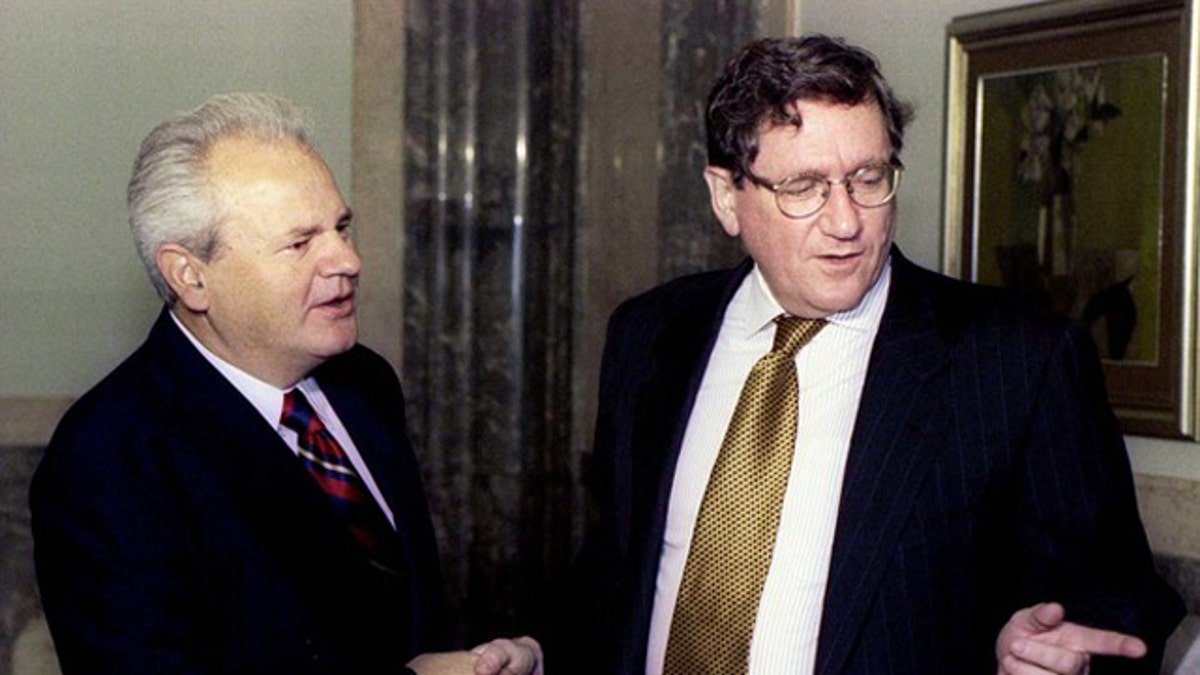
Sept. 15, 1996: Then-Serbian President Slobodan Milosevic and U.S. peace envoy Richard Holbrooke, right, shake hands at the beginning of a meeting in Belgrade. (Reuters)
THE HAGUE, Netherlands – Former Yugoslav President Slobodan Milosevic was an avid reader of legal thrillers, a Frank Sinatra fan and a doting husband who called his wife every day while he was on trial for fomenting the deadly Balkan wars, according to his chief jailer.
A diplomatic cable published by secret-spilling site WikiLeaks paints a surprisingly intimate picture of the late Yugoslav strongman and his life behind bars during his trial by the Yugoslav war crimes tribunal, which was halted by his fatal 2006 heart attack.
The peek into Milosevic's relationships with his family, lawyers and fellow detainees has upset his one-time protege, Radovan Karadzic, who complains that the information provided by prison authorities amounted to "interference with the proper administration of justice." He demanded an independent investigation.
"Monitoring of detainees' conversations ought to be more limited than it is, given the fact that information is being shared with people outside the tribunal," Karadzic's lawyer Peter Robinson told The Associated Press on Friday.
Karadzic is on trial for allegedly masterminding Serb atrocities during the Bosnian War.
The leaked cable came from the U.S. embassy in The Hague in late 2003 after a diplomat spoke to Timothy McFadden, the then-head of the tribunal's detention block, a complex of cells inside the high brick walls of a Dutch jail close to the North Sea shoreline.
It reveals that Milosevic and his legal advisers cooperated on defense strategy with court-appointed lawyers, known as amici curiae, despite publicly shunning them as he acted as his own defense counsel.
"By using his Belgrade advisers to liaise with the amici in secret he is able to maintain the optically favorable appearance of a single man defending himself against an unfair and powerful international process," it said.
The cable said Milosevic's wife Mirjana Markovic "served as a source of information, comfort, motivation, and strategy for Milosevic and he relied heavily on her guidance."
Robinson said that while that kind of revelation would not affect Karadzic's trial, he still objects to it.
"He wouldn't want them to be talking about his relationship with his wife either," Robinson said. "It would offend his sense of whatever minimal privacy he still has left as a detainee."
Regardless of its possible impact on Karadzic's case, the Milosevic cable offer's an insider's view of his life in jail and details his problems with high blood pressure.
McFadden described Milosevic as a "narcissistic" man who exercised at least an hour a day by walking in the yard in "sun, rain or hail." In the evenings he would read books, favoring thrillers such as the legal dramas of John Grisham -- which he preferred to read in English.
On days when he did not appear in court, Milosevic would sleep late, talk to his legal advisers, take a nap, listen to Sinatra and maybe watch a DVD smuggled into his cell by his lawyers, the cable said.
It is not the first time documents unveiled by WikiLeaks have been cited in a war crimes trial.
Last month, defense lawyers for former Liberian President Charles Taylor challenged the independence of the court trying him for allegedly supporting murderous rebels in Sierra Leon's civil war following WikiLeaks revelations.
In a leaked cable from the U.S. embassy in the Liberian capital, Monrovia, diplomats warned that Taylor could destabilize Liberia's fragile peace if he is acquitted and returns home. A verdict in his long-running trial near The Hague is expected later this year.
"The best we can do for Liberia is to see to it that Taylor is put away for a long time" the cable, dated March 10, 2009, said. It also suggested that building a case against Taylor in the U.S. could be one way of ensuring he does not return to Liberia should he be acquitted by the Sierra Leone tribunal.
Taylor's lawyer Courtenay Griffiths said the cable showed the tribunal is not independent, "because the Americans are already putting in place contingency plans so if Mr. Taylor is acquitted they will put him on trial again in the United States."
He added that another cable from the U.S. embassy in The Hague underscored the lack of independence as it showed that prosecutors were sharing information with American diplomats.
